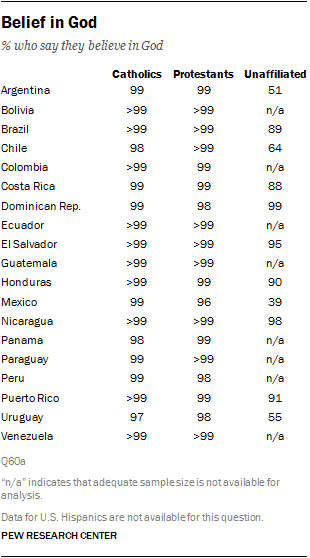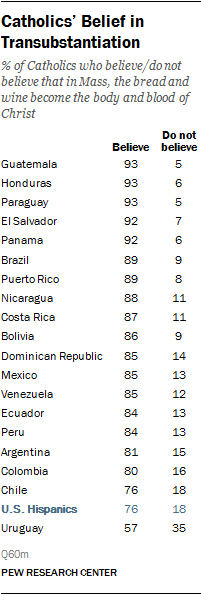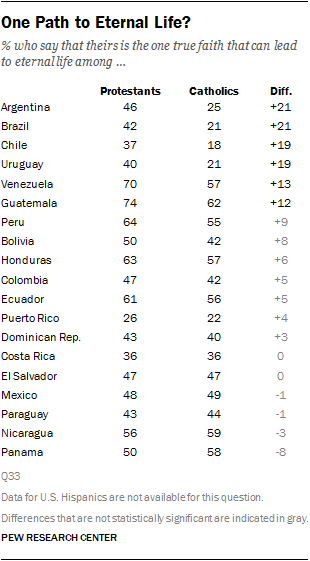
The Pew Research survey finds that nearly all Catholics and Protestants in most Latin American countries believe in God. In a number of countries, most of those who are unaffiliated with any religion also say they believe in God.
However, the survey finds significant differences between Catholics, Protestants and the unaffiliated when it comes to some religious beliefs. For instance, Protestants tend to be more likely than Catholics to take a literal view of the Bible and to believe in hell.
Protestants and Catholics also differ in their views on whether practices such as praying to the Virgin Mary or speaking in tongues fall within the Christian tradition. The vast majority of Latin American Catholics say that praying to the Virgin Mary is an acceptable Christian practice, while Protestants across the region generally reject this view. And while most Protestants see speaking in tongues as an acceptable part of the Christian faith, Catholics are divided on the subject.
The survey asked respondents whether they subscribe to a variety of beliefs and practices often associated with Afro-Caribbean, Afro-Brazilian or indigenous religions. While substantial proportions of both Catholics and Protestants say they hold at least some of these beliefs, Catholics generally are more likely than Protestants to subscribe to three or more of the eight Afro-Caribbean, Afro-Brazilian or indigenous beliefs and practices mentioned in the survey.
Belief in God, Angels and Miracles

Nearly all Latin American Christians –whether they are Catholic or Protestant – say they believe in God. Uruguay is the only country surveyed where fewer than nine-in-ten people (81%) profess such a belief.
In some countries, belief in God is widespread even among the religiously unaffiliated. For instance, overwhelming majorities of the unaffiliated in the Dominican Republic (99%), Nicaragua (98%), El Salvador (95%), Puerto Rico (91%), Honduras (90%), Brazil (89%) and Costa Rica (88%) say they believe in God. Smaller but substantial shares of the unaffiliated say they believe in God in Chile (64%), Uruguay (55%), Argentina (51%) and Mexico (39%).
Across the countries surveyed, the vast majority of Catholics and Protestants also say they believe in miracles. And in most countries surveyed, large shares of Catholics and Protestants say they believe in angels.
In general, the religiously unaffiliated are less likely than Catholics or Protestants to say they believe in either miracles or angels. But in seven of the 11 places where adequate sample sizes of this group are available for analysis, majorities of the unaffiliated say they believe in one or both phenomena. This includes Puerto Rico, where roughly seven-in-ten religiously unaffiliated respondents say they believe in angels (70%) or miracles (69%). (See survey topline for full results.)
Catholic Beliefs About Holy Communion

The vast majority of Catholics in Latin America say that they believe in transubstantiation – that the bread and wine used during Holy Communion become the actual body and blood of Christ.
In nearly every country surveyed, plus Puerto Rico, more than three-quarters of Catholics say they believe in transubstantiation. Uruguay is the one country where a smaller majority of Catholics (57%) say that during Communion, the bread and wine are transformed into the body and blood of Christ.
Catholics who attend Mass at least once a week are more likely to say they believe in transubstantiation than are Catholics who attend religious services less often, although majorities of both groups express this belief.
Biblical Literalism

In a majority of countries surveyed, half or more respondents say the Bible is the word of God and should be taken literally, word for word. This view is particularly widespread in the Central American countries of Guatemala (81%), Honduras (80%) and Nicaragua (77%). Only in the “Southern Cone” countries of Argentina (37%), Chile (36%) and Uruguay (24%) do fewer than half of adults subscribe to a literal reading of the Bible.
In the United States, 73% of Hispanics say the Bible is the word of God, but just 43% believe it should be taken literally, word for word.
Overall, Protestants in Latin America are more likely than Catholics to view the Bible as the literal word of God. This disparity is especially evident in Uruguay, where 56% of Protestants and 22% of Catholics say the Bible should be taken literally. There also are large gaps between Protestants and Catholics on this question in Chile (63% vs. 35%) and Venezuela (86% vs. 60%).
Attitudes toward the Bible vary among the religiously unaffiliated. In some countries, majorities of unaffiliated adults subscribe to biblical literalism, including six-in-ten or more in the Dominican Republic (73%), Nicaragua (70%), Honduras (66%) and El Salvador (61%). By contrast, relatively few among the unaffiliated take a literal view of the Bible in Mexico (12%), Chile (12%), Uruguay (11%) and Argentina (3%).
Views on Jesus’ Return to Earth

In many countries polled, roughly half or more of respondents believe Jesus will return to Earth during their lifetime, including majorities in Brazil (57%), Venezuela (57%), Panama (56%) and Puerto Rico (56%). Among U.S. Hispanics, 51% share this view.
In general, Protestants in Latin America are more likely than Catholics to say that Jesus’ second coming is imminent. In Chile, for example, roughly two-thirds of Protestants (68%) say that Jesus will return to Earth during their lifetime, compared with 38% of Catholics. Paraguay is an exception to this pattern; Catholics are more likely than Protestants in Paraguay to express the belief that Jesus will return during their lifetime, although less than a third of Paraguayans overall believe this.
Fewer people who are religiously unaffiliated anticipate Jesus’ return, but a third or more in the Dominican Republic (45%), Honduras (39%), Brazil (38%), El Salvador (38%), Nicaragua (38%) and Costa Rica (36%) believe such an event is imminent.
Belief in Heaven and Hell

When asked about the afterlife, majorities in most Latin American countries say they believe in heaven; on a separate question, majorities in most countries also say they believe in hell. Majorities in nearly every country also believe in hell; Uruguay is again an exception, with just 35% expressing belief in hell.
Catholics and Protestants differ little in terms of belief in heaven. Wider differences separate the two groups when it comes to belief in hell, with Protestants in most countries more likely than Catholics to believe in hell.
In countries with adequate sample sizes for analysis, the religiously unaffiliated vary widely in their views on the afterlife. Majorities among the religiously unaffiliated believe in heaven and hell in Costa Rica, the Dominican Republic, El Salvador, Honduras and Nicaragua. But no more than about a third of the unaffiliated believe in either heaven or hell in Chile (35% believe in heaven and 27% believe in hell), Uruguay (29% and 17%, respectively), Argentina (29% and 19%) and Mexico (26% and 31%).
Beliefs Associated With Afro-Caribbean, Afro-Brazilian or Indigenous Religions

The survey asked respondents if they hold certain beliefs associated with Afro-Caribbean, Afro-Brazilian or indigenous religions. These include belief in the “evil eye,” reincarnation, communicating with spirits, and magic, sorcery or witchcraft. The survey also asked respondents if they engage in practices such as making offerings to spirits, spiritual healing or seeking the help of a traditional healer.
Belief in the “evil eye”– that certain people can cast curses and spells that cause harm – is fairly common in Latin America. At least a third of respondents in every country surveyed say they believe in the evil eye, including more than half in Panama (64%), Venezuela (57%), the Dominican Republic (55%), Honduras (54%), Chile (53%) and Brazil (51%). Among U.S. Hispanics, 39% share this belief.
Fewer Latin Americans say they believe in reincarnation, communicating with spirits, and magic, sorcery or witchcraft. Still, at least a third of people in nearly every country surveyed say that magic, witchcraft or sorcery can influence people’s lives. And in most countries, roughly a quarter or more say they believe in reincarnation, as well as the possibility of being able to communicate with spirits.

In nearly every country surveyed, at least three-in-ten respondents say they have engaged in at least three of the eight indigenous beliefs and practices mentioned – belief in the evil eye, reincarnation, witchcraft or sorcery, communicating with spirits, offering food, drinks or flowers to spirits, participating in spiritual cleansing ceremonies, consulting traditional healers and experiencing black magic. (For full question wording, see the topline).
Engagement with such beliefs and practices is especially high in Panama, where a majority of people (58%) say they have engaged in at least three of these beliefs and practices (classified as “medium” to “high” levels of engagement with indigenous beliefs and practices). Roughly four-in-ten adults show at least medium levels of engagement with indigenous traditions in Mexico (44%), Honduras (42%), Bolivia (41%), Venezuela (39%) and Chile (38%).
On balance, larger shares of Catholics than Protestants report medium to high levels of engagement with indigenous beliefs and practices. In Mexico, for example, 49% of Catholics say they engage in at least three of the eight items mentioned in the survey, compared with 23% of Protestants.
Engagement with Afro-Caribbean, Afro-Brazilian or indigenous religions varies widely among the religiously unaffiliated – ranging from 45% who report medium to high levels of engagement in Nicaragua to 22% in Argentina and Mexico.
Who Qualifies as Christian?

In most countries surveyed, majorities of both Catholics and Protestants recognize each other as belonging to the Christian faith. However, Catholics tend to be more accepting of Protestants as fellow Christians than vice versa.
Differing levels of acceptance are especially pronounced in Guatemala, where 77% of Catholics consider Protestants to be Christians, but only 54% of Protestants say the same about Catholics. Other countries where Catholics are considerably more accepting of Protestants as fellow Christians than the reverse include Honduras, El Salvador, Chile, the Dominican Republic and Venezuela.
On balance, Catholics also are more likely than Protestants to say that Mormons and Jehovah’s Witnesses are Christians. And in a few countries, Catholics are more accepting of members of Afro-Caribbean, Afro-Brazilian and indigenous religions as Christians than are Protestants.And in Brazil, more Catholics (38%) than Protestants (17%) accept Spiritists as fellow Christians. (For a brief definition of Spiritism, see the glossary.)
Boundaries of Religious Practice

When it comes to religious practices, Catholics and Protestants differ in their opinions about what is acceptable within Christianity. For example, in all countries surveyed, majorities of Catholics pray to the Virgin Mary and say this is part of Christian tradition, while majorities of Protestants consistently reject praying to the Virgin Mary as a Christian practice.
Catholics and Protestants are less polarized over speaking in tongues, a practice closely associated with Pentecostalism. In most countries surveyed, majorities of Protestants say that speaking in tongues falls within the Christian tradition. Catholics are somewhat ambivalent: About half in eight countries either believe the practice is acceptable for Christians or say that Christianity has nothing to say about speaking in tongues. Fewer than half of Catholics in nearly every country say that speaking in tongues falls outside the Christian tradition. (For more on religious beliefs associated with Pentecostalism, see Chapter 4.)
One True Faith?

The survey asked respondents which of the following statements is closer to their view: “My religion is the one true faith leading to eternal life,” or “Many religions can lead to eternal life.” In a majority of countries surveyed, roughly equal shares of Catholics and Protestants say theirs is the one true faith that can lead to eternal life. In a handful of countries, however, Protestants are more likely than Catholics to see their faith as the one true religion. In Argentina, for example, nearly half of Protestants (46%) say that theirs is the only faith that can show the path to eternal salvation, while just a quarter of Catholics take this view. In Brazil, Protestants are about twice as likely as Catholics to say that theirs is the one true faith.




